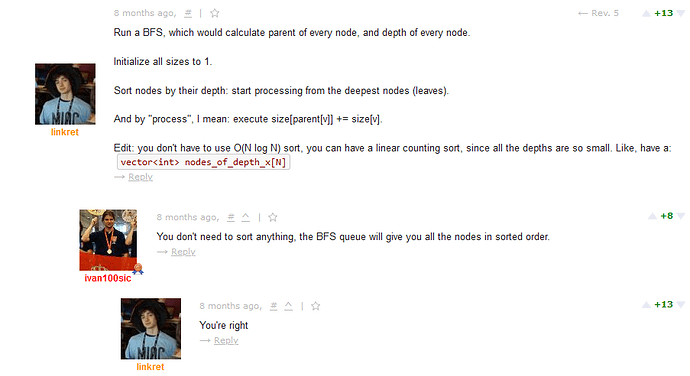I want to calculate Subtree size (for each vertex ) , of a given graph I know how to do with DFS but how can i implement using BFS ?
Iterative BFS/DFS - Codeforces
I also visit this above link , but unable to implement , I wanna do something with parent but how ? Please help @galencolin @carre @waqar_ahmad224 @hetp111
// DFS implementation
lli SubtreeSize_DFS(lli source , vi adj[] , bool* vis , lli* subtree_size){
vis[source] = 1;
lli crsize = 1;
for(auto xt : adj[source]){
if(!vis[xt])
crsize += SubtreeSize_DFS(xt,adj,vis,subtree_size);
}
subtree_size[source] = crsize;
return crsize;
}
//BFS implementataion (complete this )
void SubtreeSize_BFS(bool vis[], lli dist[], lli parent[] , lli s , lli* subtree_size){
queue<lli>q;
q.push(s);
vis[s]=1;
dist[s]=0;
parent[s] = s;
lli cnt=0;
while(q.empty()==false){
lli x = q.front();
q.pop();
for(auto xt : adj[x])
{
if(!vis[xt])
{
dist[xt] = dist[x]+1;
vis[xt]=1;
q.push(xt);
parent[xt] = x;
}
}
}
}
First calculate the number of nodes of each node. As in the code, simple recursively calculate the number of nodes by counting the children in each edge.
1 Like
For each node I have to backtrack to its parent and store count in the parent it will be N2
In above link one user said this but how can i implement - ?
Once you have the parents and depth of all nodes using BFS, start from maximum depth(N in worst case), for each node at depth ‘d’, do sz[par[node]]+=sz[node]…iterate from maximum depth to depth = 1…I guess this clears your doubt??
1 Like
Het I know iterative DFS , but question is how to find with BFS and parent array as one user said this (see pic)
2 Likes
Can u write code , it will more understable for me ( as same thing is said by other user but unable to implement that’s why i m asking here  ) , U can edit in my BFS implementation
) , U can edit in my BFS implementation
Tell me a thing Basically if we use DFS complexity is (E + V ) when we use BFS still (E+V) or ?
It’s O(E+V) in both cases…
1 Like
Isn’t time complexity is O( V * ( Number of nodes at depth ‘D’) ?
for(int i=n-1;i>0;i--)
for(auto j : nodes[i])
sz[par[j]]+=sz[j];
Outer loops N (means total vertex V) , and inner loop iteraters for all those nodes which are at depth ’ i ’
You are analyzing this loop in a wrong way, the total complexity would be O(sum of number nodes at depth ‘d’, d = 1 to n-1) which is equal to ‘n’ since you have ‘n’ nodes in total and therefore overall complexity of this loop is O(n)…is it clear now??
1 Like
Overall Complexity is V+E right same as BFS  … Thanks man ,
… Thanks man ,
can u suggest me some set of question in which This Subtree size calculation is used 
Even though you’ve found a solution, what’s the point of doing it with BFS?
1 Like
Just a thought  . . in cf blog the user said if number of nodes is105 then it will be TLE so i want an iterative approach…
. . in cf blog the user said if number of nodes is105 then it will be TLE so i want an iterative approach…
Can u share some questions so that i will practice on this topic 
I think you misunderstood the blog. The only issue with DFS was that there would possibly be a stack overflow error. But that would only happen for weaker languages like Python (not C++), and even then, there are very easy ways to get around that.
Also, to get practice problems, just search “trees” as a problem tag on CF and determine if subtree sizes would be useful for each one
2 Likes
Ok thanks  . . . My mistake
. . . My mistake

 ) , U can edit in my BFS implementation
) , U can edit in my BFS implementation